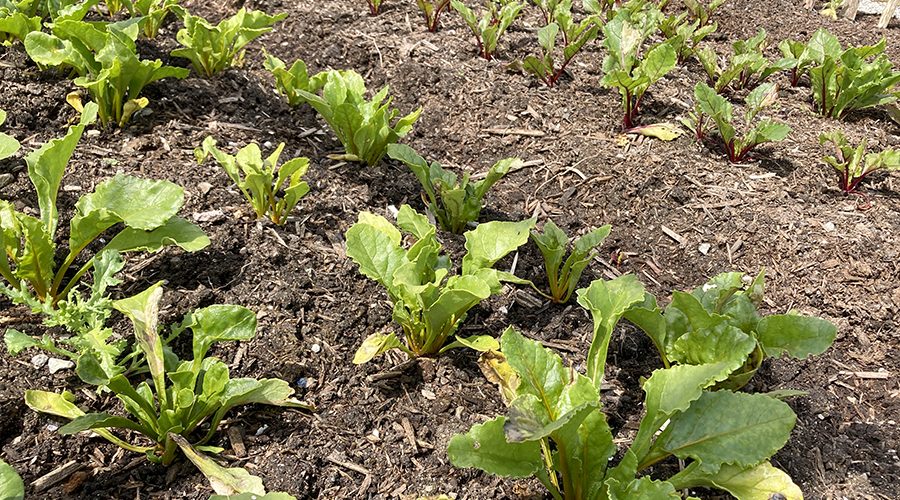These past few weeks have been incredibly dry, and this looks set to continue. On top of that, we’ve had a lot of northerly and easterly winds, which both add stress to vulnerable vegetable plants.
Some of the tough conditions that plants have been facing are:
Lack of Rain – this is a fairly obvious one, and hopefully you’ve managed to give your plants enough water and mulch to help them. Not enough water is very stressful for veg plants and
Dry/Hard Cracked Soil – this becomes problematic with exposed soil because it is then difficult for any rainfall to be soaked up. Instead it will just run off, and can cause flash flooding if there is sudden heavy rainfall. This is another reason why mulching is so invaluable as it really helps to protect the soil from drying up as badly.
Strong Northerly/Easterly Winds – although they haven’t felt quite as chilly as they did in May, these strong easterly and northerly winds are not ideal for vulnerable, heat loving veg plants. You may see symptoms of stress in plants particularly through pink-purple tints to the leaves.
Cold Night Time Temperatures – it is getting a little warmer at night now, but May was still surprisingly cold overnight and this is tough on plants. We like to judge it based on whether or not we’d want to be camping, and also whether or not we’ve swapped to a 3-tog duvet for the summer yet. Both these things have only been true for a few days, as night times have still been chilly!
Some symptoms these conditions can lead to:
- Discolouration in leaves – leaves can be quite yellow, or sometimes just pale with papery patches or a pink-purple tinge.
- Wilting – particularly with squash plants and cucumbers, you may see them wilting in the heat of the day. Leave them too long without water and they won’t recover, so do keep an eye out and water as soon as you see wilting.
- Bolting – lettuces, spinach, chard and other salad leaves like rocket and mizuna may well bolt and produce flowers early in these conditions.
- Slow growth – it can take new plants a while to get going when they are not enjoying favourable conditions. We’d expect our climbing beans to have grown more than they have, for example, and also peas and mangetout are growing quite slowly.
Top tips to help plants (in June. Advice would be slightly different in August, for example!)
- Water early in the morning, or at dusk – If you can water at these times, it will give the plants time to take up the water before it evaporates in the sun, so the plants will need watering less frequently overall.
- Watch as you water – when the soil is so dry, the water can often run off the soil and away from the veg roots before it has soaked in. Keep an eye as you’re watering, giving them a little at a time, so that you don’t waste water that runs off onto the paths rather than into your veggies.
- If the plant isn’t suffering, skip the watering – this is about limiting water use to those plants that need it most. If, say, your spinach isn’t wilting or turning yellow, then it is probably doing okay, so perhaps just water the limp looking lettuces!
- Move pots out of the wind or into the shade – this is an easy win if you’re growing in pots and containers that can easily be moved. If it is super sunny, a little shade for a few days won’t hurt them but will keep you from needing to water so frequently. And if you can get them out of the strong winds, that would be great.
- Make puddles – if you’re growing in raised beds, you can scrape the soil around the base of plants to make a puddle (or build a little ridge around the plant) so that when you water the water is caught in the puddle and will soak in directly at the plants roots rather than being wasted on bare patches of soil. It can be a good way to water plants like brassicas, corn and squashes which are generally planted a little further apart leaving exposed soil in between rows.
- Save cooking water – don’t go pouring water down the drain! Strain the water from boiled eggs/pasta/rice/veggies etc once they’re cooked into a big saucepan or stock pot, and once it has cooled you can use it to water your plants.
- Mulch – it’s not too late to mulch. If you can get your hands on some compost, then it’s a good idea to water your veggies well and thoroughly and then mulch immediately with the compost. This’ll help to lock in the moisture so it doesn’t evaporate off as quickly and you’ll find you won’t need to then water quite so often.

